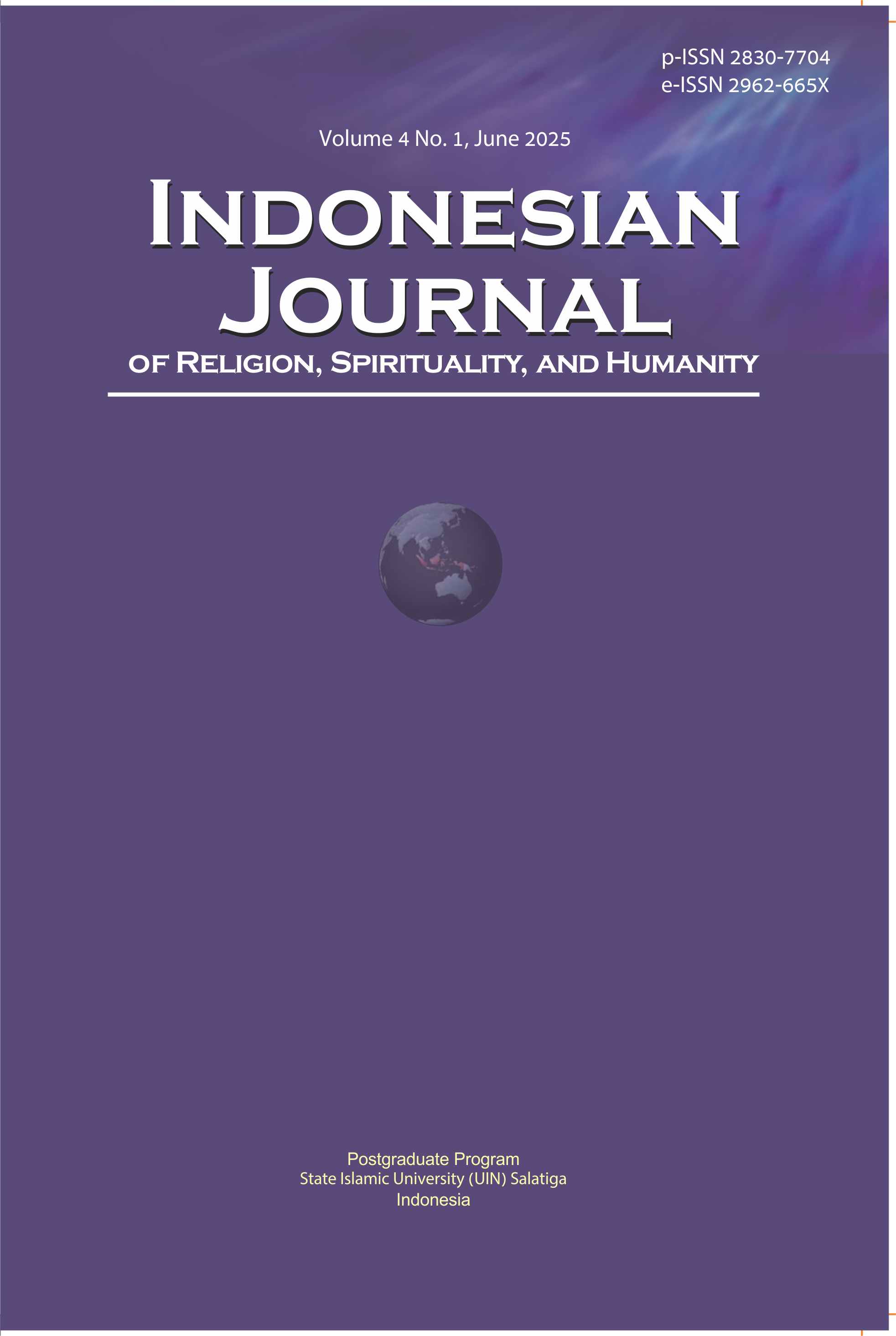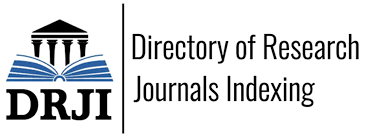Religion and technology: ethical implications of integrating artificial intelligence into religious practice and experience
DOI:
https://doi.org/10.18326/ijoresh.v4i1.25-54Keywords:
Artificial intelligence, Religious practice, Religious experience, Ethics, Principlism, IntegrationAbstract
Integrating Artificial Intelligence (AI) into religious practices offers both significant opportunities and ethical challenges that need to be carefully considered. As AI technologies become more embedded in daily life, their application within spiritual contexts, including Christianity, Buddhism, Hinduism, and Islam, raises critical questions about privacy, data security, authenticity, and the commodification of sacred experiences. This study examines the ethical issues raised by AI in religious settings and explores ways to address them. The goal is to create a balanced approach that takes advantage of technology's benefits while respecting religious beliefs. Guided by the ethical framework of Principlism theory, including not harming (non-maleficence), doing good (beneficence), fairness (justice), and freedom (autonomy), the research employs qualitative document analysis and case studies from China, India, and Japan, to explore AI’s role in virtual worship, digital religious education, and personalised spiritual guidance. AI allows for virtual worship services, breaking down physical boundaries as witnessed globally. Its algorithms can analyse religious texts, leading to deeper comprehension. Additionally, it provides tailored guidance, which can enrich spiritual paths. By utilising AI, religious practices can become more engaging and inclusive, especially for diverse populations. The paper concludes that while AI holds transformative potential for enriching religious life, its implementation must be carefully aligned with ethical principles and cultural sensitivities to preserve the integrity and authenticity of diverse religious traditions. Future research should focus on developing ethical AI frameworks through collaboration among theologians, ethicists, and AI developers, and assess their impact on community engagement and spiritual authenticity.
References
Abramov, A. A. (2020). Religious and Ethical Issues of Artificial Intelligence: Expert Assessments and the Vatican Position. Concept: Philosophy, Religion, Culture, 4(4), 68–82. https://doi.org/10.24833/2541-8831-2020-4-16-68-82
Ahmed, S., Sumi, A. A., & Aziz, N. A. (2024). Exploring Multi-Religious Perspective of Artificial Intelligence. Theology and Science, 23(1), 104–128. https://doi.org/10.1080/14746700.2024.2436783
AI for Social Good. (2024, January 10). Artificial Intelligence’s Influence on Religion - Transforming the Spiritual Landscape. Retrieved June 15, 2024, from AI for Social Good website: https://aiforsocialgood.ca/blog/artificial-intelligences-influence-on-religion-transforming-the-spiritual-landscape .
Akbarighatar, P. Operationalizing responsible AI principles through responsible AI capabilities. AI Ethics (2024). https://doi.org/10.1007/s43681-024-00524-4
Akudolu, L. (2020). A Philosophical Inquiry into The Nature and Problems of Religious Experience. Journal of Science, Humanities and Arts - JOSHA, 7(2). https://doi.org/10.17160/josha.7.2.663
Alkhouri, K. I. (2024). The Role of Artificial Intelligence in the Study of the Psychology of Religion. Religions, 15(3), 290. https://doi.org/10.3390/rel15030290
Allal-Chérif, O. (2022). Intelligent cathedrals: Using augmented reality, virtual reality, and artificial intelligence to provide an intense cultural, historical, and religious visitor experience. Technological Forecasting and Social Change, 178, 121604. https://doi.org/10.1016/j.techfore.2022.121604
Amatuzzi, M. M. (1998). Experiência religiosa: busca de uma definição. Estudos de Psicologia (Campinas), 15(1), 49–65. https://doi.org/10.1590/s0103-166x1998000100004
Andriansyah, Y. (2023). The Current Rise of Artificial Intelligence and Religious Studies: Some Reflections Based on ChatGPT. Journal of Religious Studies 22: 9–18.
Anthony, F.-V., Sterkens, C., & Hermans, C. (2007). Religious Practice and Religious Socialization: Comparative Research among Christian, Muslim and Hindu Students in Tamilnadu, India. Journal of Empirical Theology, 20(1), 100–128. https://doi.org/10.1163/157092507x188601
Arifianto, M. L. (2021). Utilizing the Quranic Arabic Corpus as a Supplementary Teaching and Learning Material for Arabic Syntax: An Overview of a Web-based Arabic Linguistics Corpus. KnE Social Sciences, 403–412. https://doi.org/10.18502/kss.v5i3.8563
Ashraf, C. (2021). Exploring the Impacts of Artificial Intelligence on Freedom of Religion or Belief online. The International Journal of Human Rights, 26(5), 1–35. https://doi.org/10.1080/13642987.2021.1968376
Awasthi, Y., & Okumu Achar, G. (2025). African Christian Theology in the Age of AI: Machine Intelligence and Theology in Africa. Journal of Research in Humanities and Social Science, 13(1), 207–216. https://doi.org/10.35629/9467-1301207216
Azari, N. P., Nickel, J., Wunderlich, G., Niedeggen, M., Hefter, H., Tellmann, L., Herzog, H., Stoerig, P., Birnbacher, D., & Seitz, R. J. (2001). Neural correlates of religious experience. European Journal of Neuroscience, 13(8), 1649–1652. https://doi.org/10.1046/j.0953-816x.2001.01527.x
Berger, A., & Golan, O. (2023). Online Religious Learning: Digital Epistemic Authority and Self-Socialization in Religious Communities. Learning, Media and Technology, 49(2), 274–289. https://doi.org/10.1080/17439884.2023.2169833
Bowen, G. A. (2009). Document Analysis as a Qualitative Research Method. Qualitative Research Journal 9 (2): 27–40. https://doi.org/10.3316/QRJ0902027
Chanda, A. (2021). Key Methods Used in Qualitative Document Analysis. https://doi.org/10.31219/osf.io/ycbme
Cheong, P. H. (2020). Religion, Robots and Rectitude: Communicative Affordances for Spiritual Knowledge and Community. Applied Artificial Intelligence, 34(5), 412–431. https://doi.org/10.1080/08839514.2020.1723869
Dimitra Chatzivasileiou, Psomiadi, A., Theoharris William Efthymiou-Egleton, & Kassar, L. (2024). AI, International Relations & Religion. Journal of Politics and Ethics in New Technologies and Artificial Intelligence, 3(1), e37109–e37109. https://doi.org/10.12681/jpentai.37109
Elmahjub, E. (2023). Artificial Intelligence (AI) in Islamic Ethics: Towards Pluralist Ethical Benchmarking for AI. Philos. Technol. 36, 73. https://doi.org/10.1007/s13347-023-00668-x
Firnando, H. G., & Wahyudi, M. (2024). The Role of Artificial Intelligence in Shaping the Islamic Worldview of the Digital Economy. Journal of Islamic Economics and Philanthropy, 6(3), 231–249. https://doi.org/10.21111/jiep.v6i3.11386
Gabriel, I. (2020). Artificial Intelligence, Values, and Alignment. Minds & Machines 30, 411–437. https://doi.org/10.1007/s11023-020-09539-2
Geraci, R. M. (2021). Religion Robotics. Material Religion, 17(4), 544–546. https://doi.org/10.1080/17432200.2021.1947029
Geraci, R. M. (2006). Spiritual robots: Religion and our scientific view of the natural world. Theology and Science, 4(3), 229–246. https://doi.org/10.1080/14746700600952993
Graves, M. (2021). Emergent Models for Moral AI Spirituality. International Journal of Interactive Multimedia and Artificial Intelligence, 7(1), 7. https://doi.org/10.9781/ijimai.2021.08.002
Hamdi, M. (2024). How AI is Transforming and Shaping the Future of Education. 000115–000116. https://doi.org/10.1109/ines63318.2024.10629089
Hamjah, S. H., & Muhamad Arib, N. (2015). Discussion on Religious Practice in Counseling: a Preliminary Survey. Mediterranean Journal of Social Sciences. https://doi.org/10.5901/mjss.2015.v6n6s5p394
Hana, A. W., & Lie, N. H. (2024). Artificial Intelligence Sebagai Mitra Pengajaran. https://doi.org/10.60157/conscientia.v3i1.48
Hastuti, Rochmi & Syafruddin,. (2023). Ethical Considerations in the Age of Artificial Intelligence: Balancing Innovation and Social Values. West Science Social and Humanities Studies. 1. 76-87. https://doi/org/10.58812/wsshs.v1i02.191
Hollywood, A. (2010). Spiritual but Not Religious. Harvard Divinity Bulletin. Retrieved October 12, 2024 from https://bulletin.hds.harvard.edu/spiritual-but-not-religious/
Huang, C., Zhang, Z., Mao, B., & Yao, X. (2022). An Overview of Artificial Intelligence Ethics. IEEE Transactions on Artificial Intelligence, 4(4), 1–21. https://doi.org/10.1109/tai.2022.3194503
Hutson, J., Huffman, P., & Ratican, J. (2024). Digital resurrection of historical figures: A case study on Mary Sibley through customized ChatGPT. Metaverse, 4(2). https://doi.org/10.54517/m.v4i2.2424
Kupari, H. (2016). Practice, Habitus, and Lived Religion. In Lifelong Religion as Habitus: Religious Practice among Displaced Karelian Orthodox Women in Finland (pp. 10–33). Brill. Retrieved June 12, 2024 from http://www.jstor.org/stable/10.1163/j.ctt1w8h2mf.6,
Marlina, & Yaza Azahra Ulya. (2024). Communication Strategies in Islamic Da’wah Opportunities and Challenges in the Era of Artificial Intelligence. Feedback International Journal of Communication, 1(2), 121–130. https://doi.org/10.62569/fijc.v1i2.35
Moh, M. (2024). Kontribusi Artificial Intelligence (AI) pada Studi Al Quran di Era Digital; Peluang dan Tantangan. Madinah Jurnal Studi Islam, 11(1), 99–113. https://doi.org/10.58518/madinah.v11i1.2518
Oseremi, O, O, J., Eyo-Udo, L., & Ogundipe, O. (2024). Revolutionizing Education Through AI: A Comprehensive Review of Enhancing Learning Experiences. International Journal of Applied Research in Social Sciences, 6(4), 589–607. https://doi.org/10.51594/ijarss.v6i4.1011
Rozaanah, S. (2024). Reconstructing Islamic Religious Education in the Era of Artificial Intelligence (AI): An Opportunity for Revival. 1(1), 10–18. https://doi.org/10.51590/tsqf.v1i1.2
OHRP-Office for Human Research Protections. (2022). The Belmont Report. U.S. Department of Health and Human Services. Retrieved June 29, 2024 from https://www.hhs.gov/ohrp/regulations-and-policy/belmont-report/index.html
Oyasor, E. I. (2024). The Emergence of AI and ChatGPT: Implication for Religion Sustainability in Africa. International Journal of Social Science and Religion (IJSSR), 507–528. https://doi.org/10.53639/ijssr.v5i3.283
Popova, S. S. (2024). Use of Artificial Intelligence in the Activities of Religious Associations and Control Over Them. Journal of Digital Technologies and Law, 2(1), 101–122. https://doi.org/10.21202/jdtl.2024.6
Reed, R. (2021). AI in Religion, AI for Religion, AI and Religion: Towards a Theory of Religious Studies and Artificial Intelligence. Religions, 12(6), 401. https://doi.org/10.3390/rel12060401
Restu Agestiningrum, & Siswanto Siswanto. (2024). The Effect of AI Learning System on Student Learning Outcomes and Motivation. An-Nuha Jurnal Kajian Islam Pendidikan Budaya Dan Sosial, 11(1), 1–10. https://doi.org/10.36835/annuha.v11i1.582
Ryan, M., and B. C. Stahl. 2020. Artificial Intelligence Ethics Guidelines for Developers and Users: Clarifying Their Content and Normative Implications. Emerald. June 9. https:// doi/10.1108/JICES-12–2019-0138
Samarpita, C. (2023, June 28). The Divine Code: Unraveling the Impact of AI on Religion. Retrieved June 14, 2024, from Analytics Insight website: https://www.analyticsinsight.net/artificial-intelligence/the-divine-code-unraveling-the-impact-of-ai-on-religion.
Shehu, Y. I. (2024). The Impact of Artificial Intelligence (AI) on the Evolution of Hausa Literature, Language, and Culture. 3(01), 111–116. https://doi.org/10.36349/djhs.2024.v03i01.013
Sterling, M. A. (2023, May 23). The Theological and Ethical Dangers Associated with Using Artificial Intelligence in Christian Religious Settings. Retrieved June 14, 2024, from Firebrand website: https://firebrandmag.com/articles/the-theological-and-ethical-dangers-associated-with-using-artificial-intelligence-in-christian-religious-settings.
Tampubolon, M., & Nadeak, B. (2024). Artificial Intelligence and Understanding of Religion: A Moral Perspective. International Journal of Multicultural and Multireligious Understanding, 11(8), 903-914.
Tan, C. (2020). Digital Confucius? Exploring the implications of artificial intelligence in spiritual education. Connection Science, 32(3), 280–291. https://doi.org/10.1080/09540091.2019.1709045
Taves, A. (2020). Psychology of Religion Approaches to the Study of Religious Experience. In P. K. Moser & C. Meister (Eds.), The Cambridge Companion to Religious Experience (pp. 25–54). chapter, Cambridge: Cambridge University Press.
Tominaga, S. (2023). Robot helps spread Buddhist teachings at a Kyoto temple | The Asahi Shimbun: Breaking News, Japan News and Analysis. The Asahi Shimbun. Retrieved October 16, 2024 fromhttps://www.asahi.com/ajw/articles/14861909?msockid=331f0a2cd4b764152a231ee5d59465f6.
Umbrello, S. (2023). The Intersection of Bernard Lonergan’s Critical Realism, the Common Good, and Artificial Intelligence in Modern Religious Practices. Religions, 14(12), 1536. https://doi.org/10.3390/rel14121536
Varsha, P. (2023). How Can We Manage Biases in Artificial Intelligence Systems – A Systematic Literature Review. International Journal of Information Management Data Insights, 3(1), 100165. https://doi.org/10.1016/j.jjimei.2023.100165
Walters, H. (2023, March 20). Robots are performing Hindu rituals - Asia Times. Asia Times. Retrieved October 10, 2024 from https://asiatimes.com/2023/03/robots-are-performing-hindu-rituals/
Wikipedia Contributors. (2015, October 26). Principlism. Wikipedia; Wikimedia Foundation. Retrieved October 13, 2024 from https://en.wikipedia.org/wiki/Principlism [Accessed:
Yamada, T. (2023). “Is This Real? Am I Seeing What I’m Seeing?” An Introduction to Religious Experience. SSRN Electronic Journal. https://doi.org/10.2139/ssrn.4324810
Yogita Yashveer Raghav, & Gulia, S. (2023). The Rise of Artificial Intelligence and Its Implications on Spirituality. Advances in Human and Social Aspects of Technology Book Series, 165–178. https://doi.org/10.4018/978-1-6684-9196-6.ch011
Yuli Andriansyah. (2023). The Current Rise of Artificial Intelligence and Religious Studies: Some Reflections Based on ChatGPT. ix–xviii. https://doi.org/10.20885/millah.vol22.iss1.editorial
Zaid, A., & Bennoudi, H. (2023). AI vs. Human Translators: Navigating the Complex World of Religious Texts and Cultural Sensitivity. International Journal of Linguistics, Literature and Translation, 6(11), 173–182. https://doi.org/10.32996/ijllt.2023.6.11.21
Downloads
Published
How to Cite
Issue
Section
License
Copyright (c) 2025 Armstrong Chanda

This work is licensed under a Creative Commons Attribution-ShareAlike 4.0 International License.
Copyright
Authors who publish with Indonesian Journal of Religion, Spirituality, and Humanity agree to the following terms:
- Authors retain copyright and grant the journal right of first publication with the work simultaneously licensed under a Creative Commons Attribution License (CC BY-SA 4.0)that allows others to share the work with an acknowledgement of the work's authorship and initial publication in this journal.
- Authors have the right to enter into separate, additional contractual arrangements for the non-exclusive distribution of the journal's published version of the work (e.g., post it to an institutional repository or publish it in a book), with an acknowledgment of its initial publication in this journal.
- Authors are permitted and encouraged to post their work online (e.g., in institutional repositories or on their website) prior to and during the submission process, as it can lead to productive exchanges, as well as earlier and greater citation of published work.
Licensing
This work is licensed under a Creative Commons Attribution-ShareAlike 4.0 International License.









